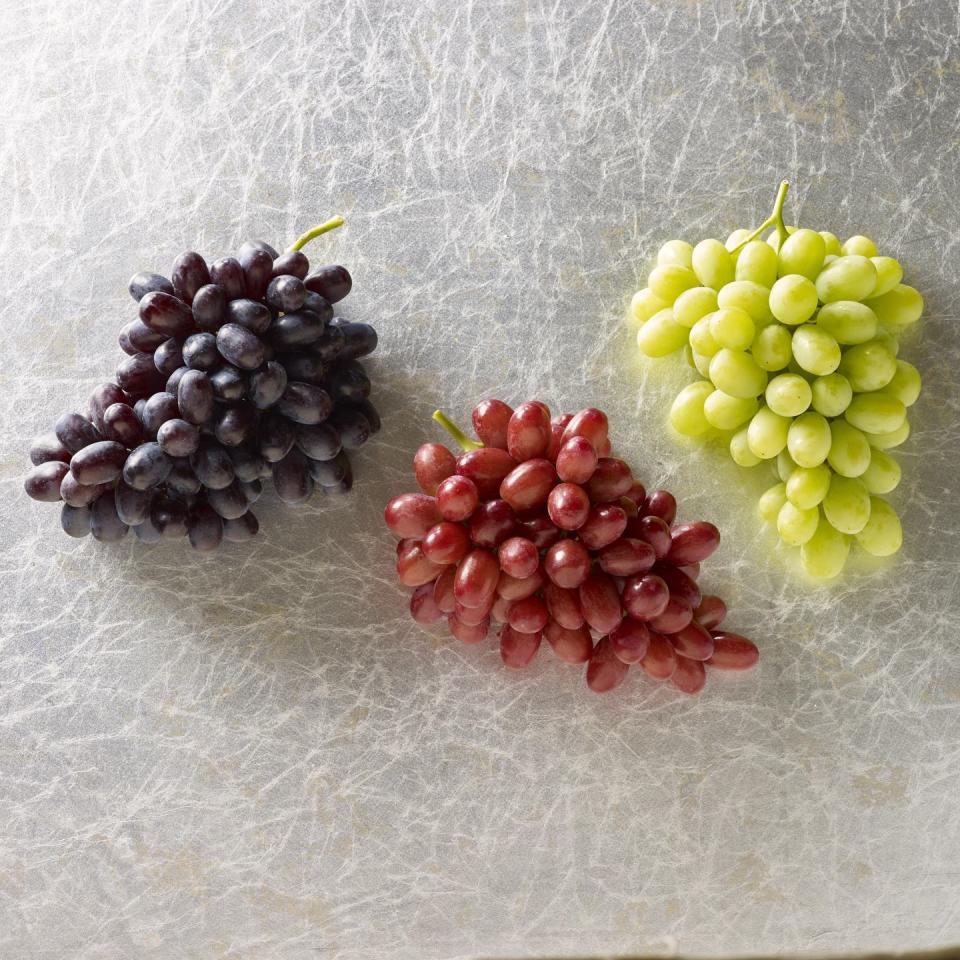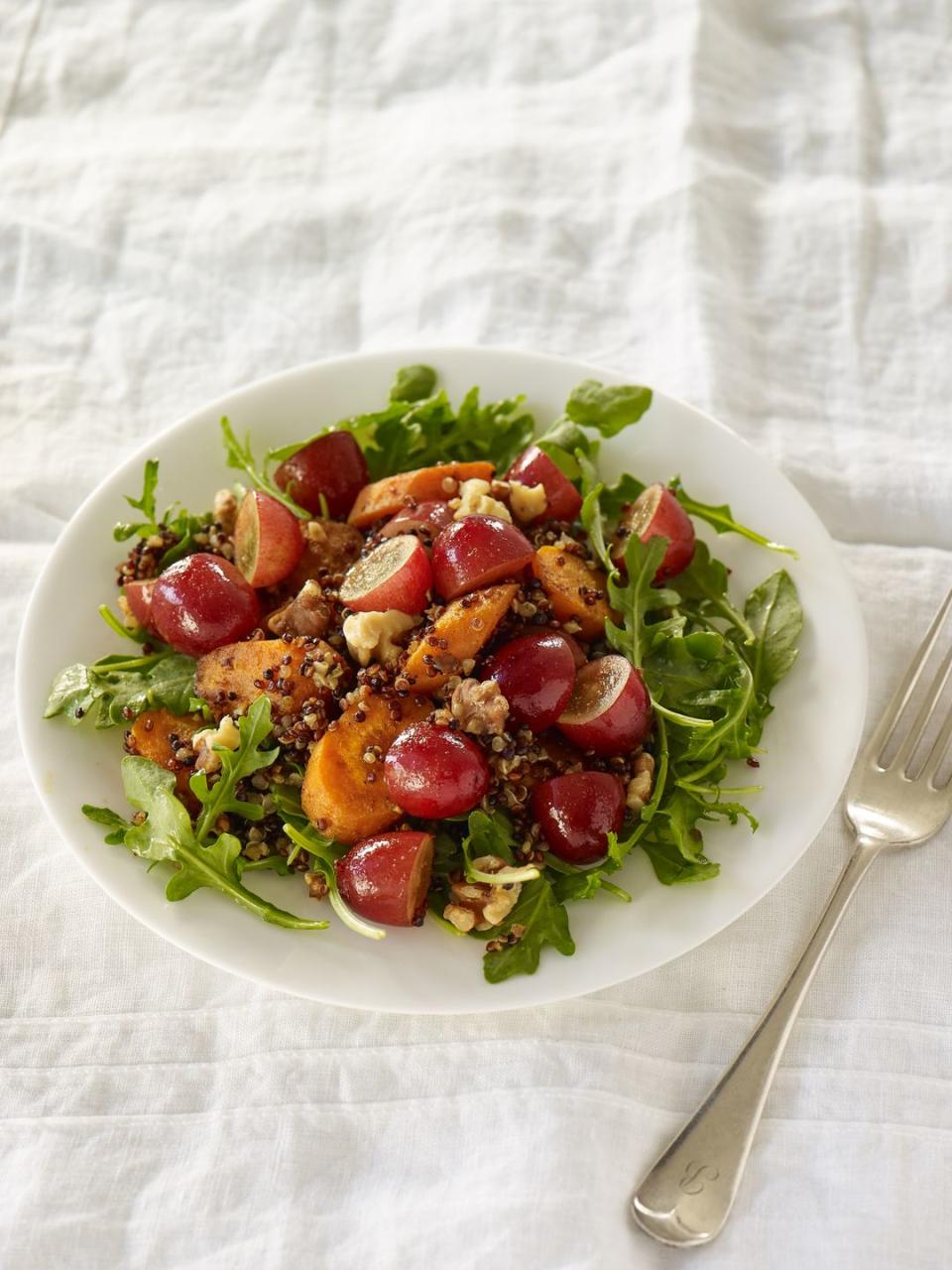We Found Out Which Type of Grape Is Best for You

“Hearst Magazines and Verizon Media may earn commission or revenue on some items through the links below.”
The greatness of grapes is real! With the first grape varieties dating as far back as 6000 B.C., this tasty fruit has been a snacking staple for centuries. Although every type of produce has a place in your diet, snacking on green, red or purple varieties can help you get the recommended 1½ to 2 cups of fruit you need each day. Believe it or not, only 10% of Americans eat enough produce according to the Centers for Disease Control and Prevention.
About 99% of the table grapes grown in the United States are grown in California, which is why we chatted with experts at the California Table Grape Commission to learn more about the juicy fruit. Here is everything you need to know about grapes from its health benefits to unique culinary uses.
Grapes Nutrition Facts
Serving Size: 1 cup (151 g)
104 calories
0 g fat
0 mg cholesterol
3 mg sodium
27 g total carbohydrate
1 g dietary fiber
Vitamin C: 5 mg
Thiamin: 0.104 mg
Riboflavin: 0.106 mg
Vitamin B6: 0.13 mg
Vitamin A: 99.7 IU
Vitamin K: 22 µg
Health Benefits of Grapes
"Over 20 years of grape research links grapes to a wide variety of health-promoting activities in the body," says Courtney Romano, M.B.A., R.D., health advisor to the California Table Grape Commission. "Grapes contain over 1600 natural compounds, including antioxidants and other polyphenols." She adds that polyphenols help protect the health and function of our cells which is the foundation of good health, and that grape polyphenols in particular promote antioxidant activity and influence cell communications that affect important biological processes in the body. Some specific health benefits of grapes include:
Heart Health: When it comes to cardiovascular health, grapes are overachievers. "Studies indicate that grapes promote healthy blood vessels through vasorelaxation, which in turn is linked to healthy blood flow and pressure," Romano shares. "Grapes have also been shown to promote healthy blood lipid profiles, counter oxidative stress and inflammation, and platelet aggregation." Grapes naturally have no saturated fat or cholesterol and are very low sodium, making them a great heart-healthy snacking choice.
Brain Health: Not only do grapes boast some impressive cardiac health benefits, but they may benefit your brain too. Research conducted with elderly individuals with mild cognitive decline found that consuming grapes every day helped preserve healthy metabolic activity in regions of the brain associated with early-stage Alzheimers’ where metabolic decline takes hold. Romano explains that grapes of all colors are a natural source of flavonols, and a recent study found that a higher intake of flavonols is associated with a 48% decreased risk of developing Alzheimer dementia; even more of a reason to add grapes to your snacking rotation.
Colon Health: In a pilot study of individuals with colon cancer, consuming grapes every day for two weeks reduced the expression of certain target genes responsible for promoting tumor growth in the colon. Romano says that this benefit was observed in healthy colon tissue, where no impact was seen in the cancerous tissue, suggesting that grapes may be beneficial in maintaining colon health.
Weight Management: Grapes are naturally a low-calorie, fat-free food with a relatively low glycemic index. Just one cup of grapes has only 100 calories and is composed of over 80% water, making them a high-volume, nutrient-dense snack that you can eat more for a lower calorie cost.
Skin Health: Researchers recently found that consuming grapes for two weeks was protective against UV light. Specifically, the study found that significantly more UV exposure was required to cause sunburn following grape consumption. "The grape diet was also associated with decreased DNA damage, preservation of skin cells, and a reduction in inflammatory markers," Romano explains.
Immune Health: "Grape compounds including antioxidants and other polyphenols, help protect the health and function of cells which is beneficial to the immune system," Romano says. "Individual grape compounds resveratrol and certain flavonoids have been linked to improved immune function."
Chemotherapy Symptom Relief: Sucking on frozen grapes is a natural remedy recommended by many oncology dietitians for cancer patients undergoing chemotherapy. Patients experiencing certain chemotherapy-related side effects such as mouth sores or dry mouth may find some relief by sucking on frozen grapes. They also may aid in alleviating nausea, another common chemotherapy side effect.
Are red or green grapes better for you?

Aside from differences in color and taste, you may be wondering if the different colors of grapes have different nutritional benefits. "All colors of grapes contain beneficial compounds that may work synergistically to benefit health, so eating a variety of grapes is ideal," Romano says.
"The main difference between the colors of grapes is that red and black grapes contain anthocyanins, which give fruit its red and blue colors. However, green grapes do contain an array of other polyphenols and may have a different mix of other types." But all three colors of grapes can produce resveratrol she adds.
Selecting and Storing Grapes:
Romano advises shoppers to look for grape bunches with green, pliable stems and plump berries. Ever notice a powdery white coating on your grapes? This is called bloom, a beneficial naturally occurring substance that protects the fruit from moisture and decay Romano explains.
Grapes are best kept refrigerated, and placing them towards the back of the fridge is ideal since that is typically the chilliest spot. Romano says to keep grapes unwashed until ready to eat and then rinse them before serving. "Avoid storing the grapes compressed or squeezed, or near any strong-smelling foods, such as onions."
Unique Ways to Use Grapes:

Enjoy grapes as a snack by themselves or get creative by using them anywhere a tomato goes Romano says. "They provide a complete refresh to any dish ... from appetizers to salads to entrée accents to dessert, grapes work across the meal spectrum." Try these delicious recipes from GH Nutritionist Approved Emblem Holder California Table Grape Commission:
Appetizers & Snacks
Entrees
You Might Also Like

